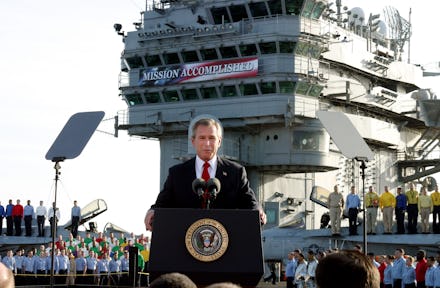No, Iraq Didn't Have 'Weapons of Mass Destruction' After All

The news: Whatever happened to those "weapons of mass destruction" the U.S. was worried Saddam Hussein had? They're all over Iraq — but not in the form the Bush administration imagined.
So are these the weapons of mass destruction we've been hearing about for years? Despite the headlines shouting about weapons of mass destruction in Iraq, the Times reports that the chemical weapons discovered by U.S. soldiers after the 2003 invasion were virtually unusable, and the Iraqi government simply didn't have the production facilities to make workable chemical weapons the way Bush claimed.
But that's not the worst part of the Times investigation. Because the leftover stores didn't fit the convenient narrative that Hussein had large-and-ready stockpiles of weapons of mass destruction, military officials at times suppressed the evidence or ordered troops to keep their mouths shut — even when they fell sick.
These are not the WMDs we're looking for. In 2003, President George W. Bush claimed before the U.N. that "Right now, Iraq is expanding and improving facilities that were used for the production of biological weapons. ... The regime is rebuilding and expanding facilities capable of producing chemical weapons."
According to the Times investigation, the discovery of these moldering chemical weapons, useless in any conventional military sense, "did not support the government's invasion rationale." The ordinance encountered was too old to have been used by the dictator even in 2003. By now deteriorated and leaking, the aged stockpiles could never be used as weapons of mass destruction, despite the fact that militants stole them and used them in improvised explosive devices and other attacks while others were sold on the black market. So the pre-1991 weapon stockpiles were hidden as embarrassing evidence that the White House had failed to find the promised WMDs.
And these weren't even the WMDs the Bush administration was looking for. In 2004, the Iraq Study Group concluded that Iraq's nuclear program had been dead as a doornail since well before the invasion. In the same report, the group said that two wars and sanctions had "reduced Iraqi's premier production facility to a stockpile of old, damaged, and contaminated chemical munitions (sealed in bunkers), a wasteland full of destroyed chemical munitions, razed structures, and unusable war-ravaged facilities."
U.S. troops were still in danger — and the government didn't tell anyone. Unfortunately, the Times found that the Bush-era Pentagon failed disastrously to prepare soldiers in Iraq for even these low-grade chemical hazards. Instead of disposing of them in a safe and efficient manner, they were downright sloppy:
Nonproliferation officials said the Pentagon's handling of many of the recovered warheads and shells appeared to violate the Convention on Chemical Weapons. According to this convention, chemical weapons must be secured, reported and destroyed in an exacting and time-consuming fashion.
When soldiers were exposed to chemical agents, the government simply kept things under wraps. "The American government withheld word about its discoveries even from troops it sent into harm's way and from military doctors," the Times reported. "The government's secrecy, victims and participants said, prevented troops in some of the war's most dangerous jobs from receiving proper medical care and official recognition of their wounds."
Even more embarrassing. There's another reason the U.S. might be embarrassed to acknowledge the incidents. In "five of six" incidents where soldiers were exposed to the agents, the "munitions appeared to have been designed in the United States, manufactured in Europe and filled in chemical agent production lines built in Iraq by Western companies."
The investigation is worth reading, but it ends on an ominous note: Earlier this year, Islamic State militants captured the Muthanna chemical weapons facility where thousands of the munitions were planned to be entombed in concrete forever. While the State Department insists the materials are of no "military value," who knows what IS will dig up?